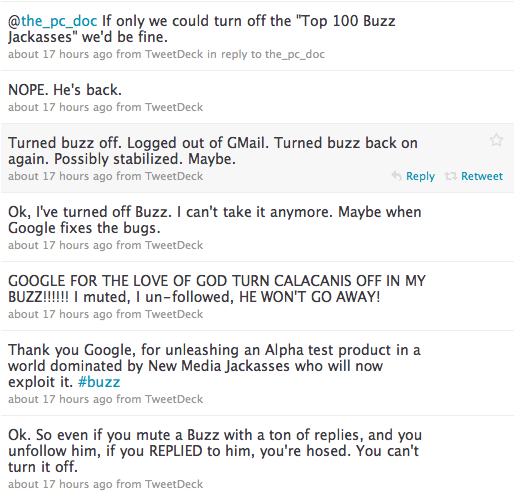Google Buzzfail

Quick - how do you tell when someone's sucking too much Kool-Aid? Answer: When they take an almost entirely positive view of a technology and miss something that is less than bleeding obvious but still a showstopper.
So it is that my colleague Dion Hinchcliffe says of Google Buzz:
My take: Google Buzz is well-designed and useful but it’s going to be seriously challenged because the very people most likely to be interested in Buzz will already have places to carry out their online social activities. This means Google Buzz may end up being more useful in places where there’s a lot less dominance by the consumer Social Web, such as in the enterprise.
Hold it tiger. While I wasn't exactly straight out the gate on this one I sure am glad I hung back. Google Buzz is intrusive and contains a major privacy problem.
Jennifer Leggio had this to say:
...there’s no hiding from it. If you’re on Gmail, you’re buzzable. You can choose not to buzz and you can choose not to follow others but you can’t really choose not to participate (Updated: There is an option to turn off Buzz at the very bottom of your Gmail pane). If you are using Google Picasa and Google Reader yet are not wholly aware of Buzz, you may not realize what you are publishing and promoting to your Buzz stream because you may not know it exists. Yes, Virginia, there are people who don’t live and breathe social networking.
I've not seen anything from Jason Perlow on these pages (Update: Jason describes his woes with Buzz) but I saw what he had to say on Twitter (you need to read from the bottom up):
In other words - we're being spammed.
In my own assessment niftily titled Google: Buzz Off! I said:
Despite the claim to help me: ‘to start conversations about the things you find interesting,’ it does nothing of the sort. Instead, it adds in any ’stuff’ that people it has decided I am following put into their Buzz (a bit like Twitter) along with any other accounts that Google has linked via their profiles such as Flickr, Twitter, Google Reader, assorted blogs….the list goes on. In other words it is aggregating a pile of stuff and lobbing it over the wall into my GMail.
Now – don’t get me wrong. I like my friends. A lot. But I’m blowed if I need or want to know their EVERY movement on the Internet. I’m pretty sure the same feeling is reciprocated.
Then I discovered that Google has opened up a way of messing with my privacy that even Facebook CEO Mark Zuckerberg must be kicking himself for not exploiting. According to Silicon Valley Insider:
The problem is that — by default — the people you follow and the people that follow you are made public to anyone who looks at your profile.
In other words, before you change any settings in Google Buzz, someone could go into your profile and see the people you email and chat with most.
This is so whacked out as to be beyond the pale. While Google has yet to incorporate Buzz into GAPE, the intention is there. Google should be praised for its recent successes in getting into some large corporates and replacing more expensive email systems. But if it does include Buzz as currently iterated then I also say:
Make sure you REALLY understand what it will and will not do. The last thing you want is for Buzz to effectively mine and expose your internal contacts list and blast that out to the world at large.
Suw Charman-Anderson makes a more nuanced observation in her Google Buzz: Not Fit For Purpose post:
Email is causing significant problems for people, not just because of the volume of email we get these days but because dopamine circuits in our brain encourage us to seek new information and cause us to check our email more often than we realise. Every time we check email, we waste about 64 seconds getting back into doing what we were doing before. Some people check email every 5 minutes. That’s an 8-hour day each week that we waste in mental limbo. Email is a significantly counter-productive tool yet it’s our default for almost all communications.
By adding in a new source of random reward – Buzz – Google have made their inbox even more addictive and unproductive. Not only do you have a new unread Buzz messages count to lure you into checking and rechecking, Buzz also tangles up Buzz replies with your email in your email inbox. Whilst that may seem sensible from an engineering point of view, or for someone whose inbox is quiet or beautifully organised, for me and the many people like me for whom inbox is a daily struggle, this is a disaster. I just do not need extra fluff filling up my inbox.
Within two hours of Buzz invading my GMail I'd found I was wasting so much time, nothing productive was being achieved. OK - so we need give attention to the new shiny toys. But if you live in the corporate world, that level of productive destruction is unacceptable. I turned Buzz off.
